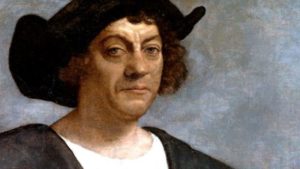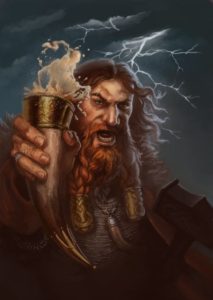Today is Columbus day in the US, and so I technically have a day off from teaching. However, despite a day of alleged freedom (I still have a stack of grading to do) the fact that we get a holiday to celebrate Columbus galls me. Firstly, because he was responsible for mass enslavement of indigenous people (over 1000 in just one round up, of which 550 were sent to Spain, with about 40% dying en route), sending an estimated 5000 Taino, Arawak and other indigenous peoples to Europe. His treatment of these enslaved people was barbaric – they were forced to bring him gold and failure to do so led to mass amputations and death. An estimated quarter of a million indigenous people died in Haiti alone due to resisting Columbus’ Governorship of Hispaniola, and many more died from diseases he and his crew introduced to the Caribbean.
However, secondly, he doesn’t deserve recognition for discovering North America. He never set foot on the North American continent*. If we should be recognizing someone from this era, it would be John Cabot.
Giovanni Caboto (anglicized to John Cabot#), an Italian, set sail from his base in Bristol, England, “to sail to all parts…to find, discover and investigate whatever islands, countries, regions or provinces” (these are the terms of a license granted to him by England’s King Henry VII). He landed in North America** on 24 June 1497, after a 35 day voyage.
Cabot’s journey was not such a leap into the dark as it might seem. Bristol vessels had been sailing as far as Iceland to get cod*** since 1436. After the Hanseatic merchant league tried to cut off Britain’s trade with Iceland in 1496, Bristoleans looked for other sources of fish – and found them. It looks like ships were sailing to the Grand Banks (off of Newfoundland) to catch the abundant cod there from the 1480s. In fact, when a deal was offered by the Hanseatic league to resume the trade of Icelandic fish in 1490, the British declined, as by then they had more than enough cod.****
Cabot reported his “official” discovery on 10 August 1497 to King Henry and gave lectures on his discovery to foreign officials over the next few weeks. Cabot was granted funds for a more substantive expedition, with five ships, and departed Bristol to head back to “Brazil” in May 1498.***** The primary aim of this voyage was to sail further south and continue investigating this new land. However, one of these ships landed prematurely in Ireland due to a storm and the other four, including the one carrying Cabot, were never heard of again.
But…in 1499 a Spanish expedition led by Alonso de Hojeda (and carrying Amerigo Vespucci, who is generally credited as the inspiration for the name America) set sail for the waters to the south of Hispaniola, and reached the mainland coast of Central and northern South America. Hojeda’s expedition was not much better than Columbus’, as they conducted a spree of “killing, robbing and fighting” against the indigenous populations they encountered. Spanish historian Martin Fernandez de Navarrete wrote that in 1499 the Hojeda expedition “encountered certain Englishmen” off the northeastern tip of Colombia. These English sailors were presumably dispatched by the ruthless Hojeda – in fact, he was granted a gift of land by the Spanish crown “for the stopping of the English.” It is possible at least some of the vessels of the second Cabot expedition did reach the North American coast and carried out their mission of exploring further south, until they encountered the Spanish expedition on the coast of South America.******
Unless you live in Canada (or near Bristol as I did growing up), you have probably heard little, if anything, of Cabot. But he certainly should receive more credit for “discovering” North America* than Columbus, who never set foot on the North American mainland*, and who was generally a horrible human being. Columbus (and Amerigo Vespucci) and their royal patrons did, however, have an excellent PR machine, and managed to largely airbrush Cabot’s achievements (and quite possibly the murder of him and his crew) out of history.*******
However, the “New World” was of course already discovered, by several waves of human settlers, the descendants of Native Americans, and in 985 by Bjarni Herjólfsson and then quickly settled by Leif Erikson. If you really want to celebrate European discovery today, give a hat tip to John Cabot (who as far as we know never murdered, mutilated or enslaved anyone) or raise a horn of mead to the Norse. Or better still, lobby to have the Columbus Day Holiday renamed Indigenous People’s Day (as has been done in several US states or municipalities), and let’s stop celebrating a horrible human being!
Notes
# As in the infamous New England town Cabot Cove of Murder She Wrote. This town should be the murder capital of the world. Cabot Cove had 5.3 murders a year in a population of just 3,560, which translates to a record breaking 1490 murders per million. In contrast, the British slaughterfest that is Midsomer (i.e., the British TV show Midsomer Murders) has only a murder rate of 32 per million.
*By “North America” I am referring to mainland Mexico, USA, Canada and Greenland. Columbus did voyage to the Central and Southern American mainlands.
** Probably Nova Scotia in Canada, as his log described passing an island likely to be Newfoundland on his departure.
*** “Stockfish” – dried, salted fish, primarily used for the numerous red-meat free “fast” days in the Middle Ages.
**** Letters from the British spy John Day (who had been reporting on Cabot’s exploits) note that Cabot had landed on the Island of Brazil, which was “discovered in the past by the men from Bristol who found ‘Brasil’ as your lordship well knows.”
***** One of Cabot’s funders was Richard Ameryk, and some postulate that America might actually be named after this sponsor.
****** In 1500, Hojeda was granted the Governorship of the province he “discovered” and his license specifically mentions that he should occupy the lands to the west “where the English were making discoveries“and put them under the soverignty of Spain, while “[halting] the exploration of the English in that direction”.
******* Which, considering the stakes – the vast wealth, resources and lands of the “New World” – it makes perfect political sense that the Spanish and Portuguese would try to minimize British or Italian claims to the “New World”.
Bibliography
Loewen, J.W. (1996). Lies My Teacher Told Me: Everything Your American History Textbook Got Wrong. New york: Simon and Schuster.
Stannard, D.E. (1993). American Holocaust: The Conquest of the New World. Oxford: Oxford University Press.
Wilson, I. (1996). John Cabot and the Matthew. St John’s, Newfoundland: Breakwater Press.
Zinn, H. (2003). A People’s History of the United States. New York: HarperCollins


I always though Columbus reached land on the 12th of October of 1492 (I’m Spanish and they made us study that date in History class. Wikipedia thinks the same (https://en.wikipedia.org/wiki/Voyages_of_Christopher_Columbus#The_voyages_and_events). For the rest, I agree with you, Columbus doesn’t deserve a day.
Chris, in 1502 on his fourth voyage Columbus explored the coast of Panama and Honduras. So he did discover the continent of North America. Better stop reading poorly researched books.
Honduras and Panama are both in “Central America” and not “North America”. But I’ll edit that to make it clearer
He landed in the Caribbean and Central America not “North America”. I’ll make that clearer in the article